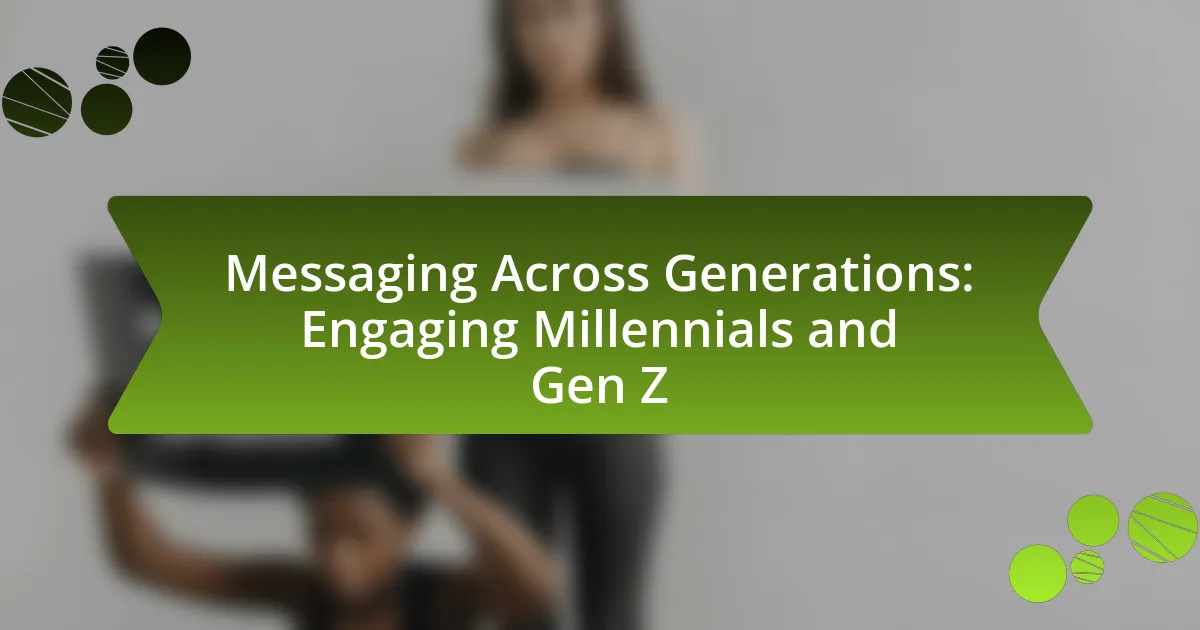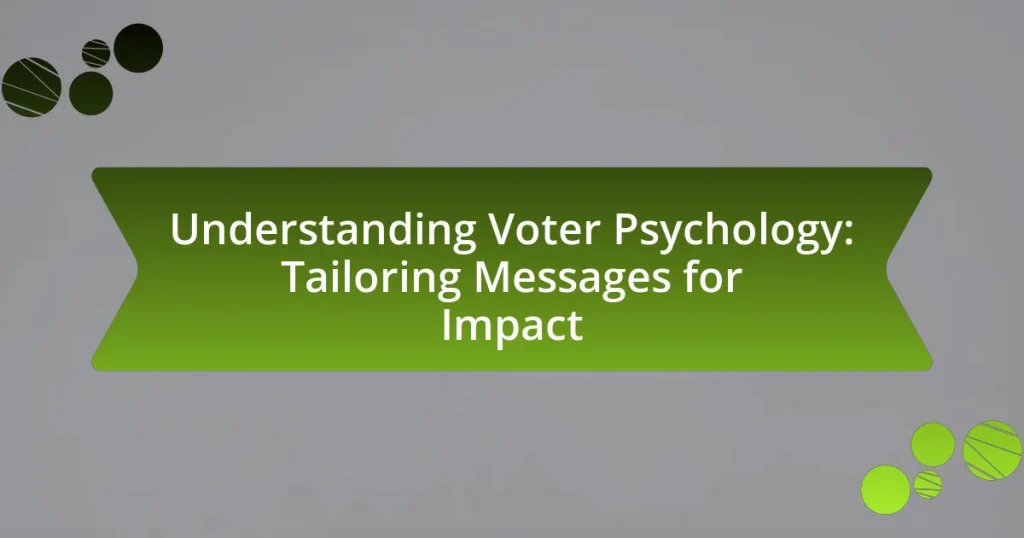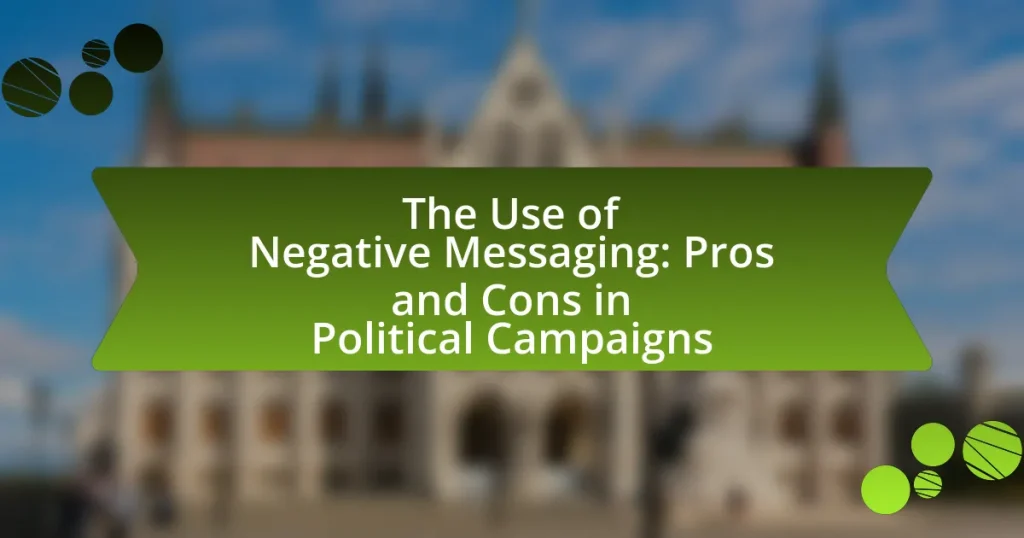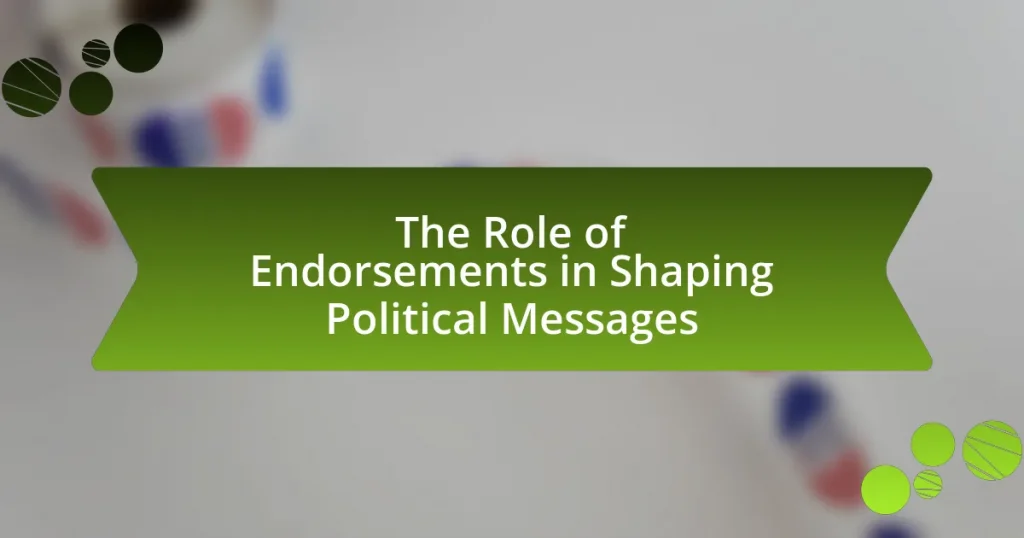The article “Messaging Across Generations: Engaging Millennials and Gen Z” examines the distinct characteristics and communication preferences of Millennials and Gen Z, highlighting their digital nativity, social consciousness, and demand for authenticity. It explores how these generational traits influence messaging strategies, emphasizing the importance of tailored communication that resonates with their values. Key topics include preferred messaging platforms, the role of technology in shaping communication styles, and effective engagement strategies for brands. The article also addresses the challenges marketers face in connecting with these demographics and offers practical tips for creating inclusive and authentic messaging that fosters brand loyalty.

What are the key characteristics of Millennials and Gen Z?
Millennials and Gen Z are characterized by their digital nativity, social consciousness, and preference for authenticity. Millennials, born between 1981 and 1996, are known for their adaptability to technology and value experiences over material possessions. They prioritize work-life balance and are often driven by purpose in their careers. Gen Z, born from 1997 onward, is the first generation to grow up with smartphones and social media, leading to a strong emphasis on online communication and community engagement. They are highly aware of social issues, advocating for diversity, sustainability, and mental health awareness. Both generations favor brands that align with their values and demonstrate transparency.
How do Millennials and Gen Z differ in their communication preferences?
Millennials and Gen Z differ significantly in their communication preferences, primarily in their favored platforms and styles. Millennials tend to prefer email and text messaging for professional communication, valuing clarity and formality, while Gen Z favors instant messaging apps like Snapchat and TikTok, emphasizing brevity and visual content. Research from the Pew Research Center indicates that 95% of Gen Z uses social media, compared to 90% of Millennials, highlighting Gen Z’s inclination towards more dynamic and interactive forms of communication. Additionally, Gen Z is more likely to engage in asynchronous communication, reflecting their comfort with digital interactions, whereas Millennials often appreciate synchronous communication methods.
What platforms do Millennials prefer for messaging?
Millennials prefer messaging platforms such as WhatsApp, Facebook Messenger, and Snapchat. According to a 2021 survey by Pew Research Center, 49% of Millennials reported using WhatsApp for messaging, while 44% favored Facebook Messenger. Additionally, Snapchat is popular among this demographic, with 38% indicating regular use for communication. These platforms are favored for their user-friendly interfaces and features that enhance social interaction.
What platforms do Gen Z favor for communication?
Gen Z favors platforms such as Snapchat, Instagram, and TikTok for communication. These platforms are preferred due to their visual-centric features and ephemeral content, which align with Gen Z’s desire for quick, engaging interactions. According to a 2021 survey by Pew Research Center, 85% of teens aged 13 to 17 reported using Snapchat, while 72% used Instagram, highlighting the dominance of these platforms in their communication habits.
Why is understanding these generations important for effective messaging?
Understanding the characteristics and preferences of Millennials and Gen Z is crucial for effective messaging because it enables marketers to tailor their communication strategies to resonate with these specific audiences. Millennials, who value authenticity and social responsibility, respond positively to brands that align with their values, while Gen Z, known for their digital fluency and preference for visual content, engages more with platforms like TikTok and Instagram. Research indicates that 70% of Gen Z consumers prefer brands that reflect their personal values, highlighting the necessity for targeted messaging that speaks directly to their beliefs and behaviors. By recognizing these generational differences, brands can create more relevant and impactful marketing campaigns that drive engagement and loyalty.
How do generational values influence messaging strategies?
Generational values significantly influence messaging strategies by shaping the preferences and expectations of different age groups. For instance, Millennials prioritize authenticity and social responsibility, leading brands to adopt transparent and purpose-driven messaging. In contrast, Gen Z values inclusivity and digital engagement, prompting marketers to utilize interactive and visually appealing content across social media platforms. Research by McKinsey & Company indicates that 70% of Millennials are more likely to support brands that align with their values, while a study by The Center for Generational Kinetics shows that 60% of Gen Z prefers brands that reflect their diverse identities. These insights demonstrate that understanding generational values is crucial for developing effective messaging strategies that resonate with target audiences.
What role does technology play in shaping communication styles?
Technology significantly influences communication styles by facilitating instant connectivity and enabling diverse forms of expression. The rise of social media platforms, messaging apps, and video conferencing tools has transformed traditional communication methods, allowing for real-time interactions and multimedia sharing. For instance, a study by Pew Research Center in 2021 found that 97% of teens use social media, which shapes their communication preferences towards brevity and visual content, such as emojis and GIFs. This shift highlights how technology not only alters the speed of communication but also the content and style, favoring informal and concise exchanges over formal language.
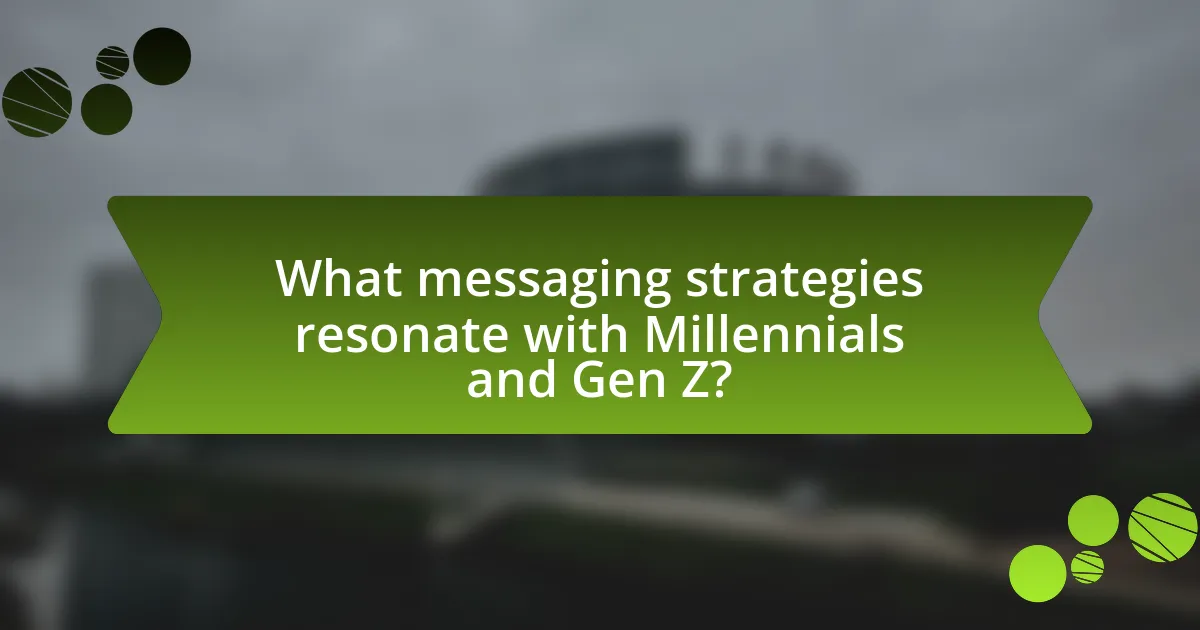
What messaging strategies resonate with Millennials and Gen Z?
Messaging strategies that resonate with Millennials and Gen Z include authenticity, social responsibility, and visual storytelling. Authenticity is crucial, as these generations prefer brands that are genuine and transparent in their communications. A study by Stackla found that 86% of consumers believe authenticity is important when deciding what brands to support. Social responsibility also plays a significant role; according to a survey by Cone Communications, 70% of Millennials and 64% of Gen Z are willing to pay more for products from brands committed to positive social and environmental impact. Lastly, visual storytelling, particularly through platforms like Instagram and TikTok, effectively engages these audiences, as they favor content that is visually appealing and easily digestible.
How can brands effectively engage with these generations?
Brands can effectively engage with Millennials and Gen Z by leveraging digital platforms and authentic storytelling. These generations prioritize transparency and relatability, making it essential for brands to communicate genuine values and social responsibility. According to a 2021 survey by Deloitte, 83% of Millennials and 77% of Gen Z prefer brands that align with their personal values. Additionally, utilizing social media influencers can enhance brand visibility and trust, as 70% of Gen Z report being influenced by social media in their purchasing decisions. Engaging content that resonates emotionally and encourages interaction, such as user-generated content and interactive campaigns, further strengthens brand connection with these demographics.
What types of content are most appealing to Millennials?
Millennials are most appealed by content that is authentic, visually engaging, and interactive. Research indicates that 86% of Millennials prefer user-generated content over brand-created content, highlighting their desire for authenticity and relatability. Additionally, video content, particularly short-form videos, resonates strongly with this demographic, as platforms like TikTok and Instagram Reels have gained immense popularity among them. Furthermore, content that incorporates social issues and promotes inclusivity tends to engage Millennials effectively, as they value brands that align with their social values.
What messaging formats attract Gen Z’s attention?
Visual content formats, particularly short videos and memes, attract Gen Z’s attention effectively. Research indicates that 85% of Gen Z prefers video content, with platforms like TikTok and Instagram Reels being particularly popular for their engaging and easily digestible nature. Additionally, interactive formats such as polls and quizzes resonate well, as they encourage participation and foster a sense of community. These preferences are supported by studies showing that Gen Z values authenticity and creativity in messaging, making visually appealing and interactive formats more likely to capture their interest.
Why is authenticity crucial in messaging for these demographics?
Authenticity is crucial in messaging for Millennials and Gen Z because these demographics prioritize genuine connections and transparency in communication. Research indicates that 83% of Millennials and 76% of Gen Z prefer brands that are authentic and honest in their messaging, as they are more likely to trust and engage with companies that reflect their values. This emphasis on authenticity stems from their experiences with social media and digital communication, where they are exposed to curated content and inauthentic representations. Consequently, brands that convey authenticity are more likely to foster loyalty and drive engagement among these generations.
How does transparency impact brand loyalty among Millennials?
Transparency significantly enhances brand loyalty among Millennials. This generation values authenticity and ethical practices, leading them to favor brands that openly communicate their values, sourcing, and business practices. According to a 2021 study by the Edelman Trust Barometer, 86% of Millennials believe that transparency is crucial for building trust in a brand. Furthermore, brands that demonstrate transparency are more likely to foster emotional connections, as 70% of Millennials reported that they would remain loyal to a brand that is honest about its operations and challenges. This correlation between transparency and loyalty underscores the importance of clear communication in brand strategy targeting Millennials.
What are the consequences of inauthentic messaging for Gen Z?
Inauthentic messaging leads to distrust and disengagement among Gen Z. This generation values transparency and authenticity, and when brands fail to deliver genuine communication, they risk alienating their audience. A study by the American Psychological Association found that 70% of Gen Z consumers are more likely to support brands that demonstrate authenticity. Additionally, inauthentic messaging can result in negative brand perception, as 60% of Gen Z individuals reported feeling frustrated when brands do not align with their values. This disconnect can ultimately lead to decreased brand loyalty and reduced consumer spending.
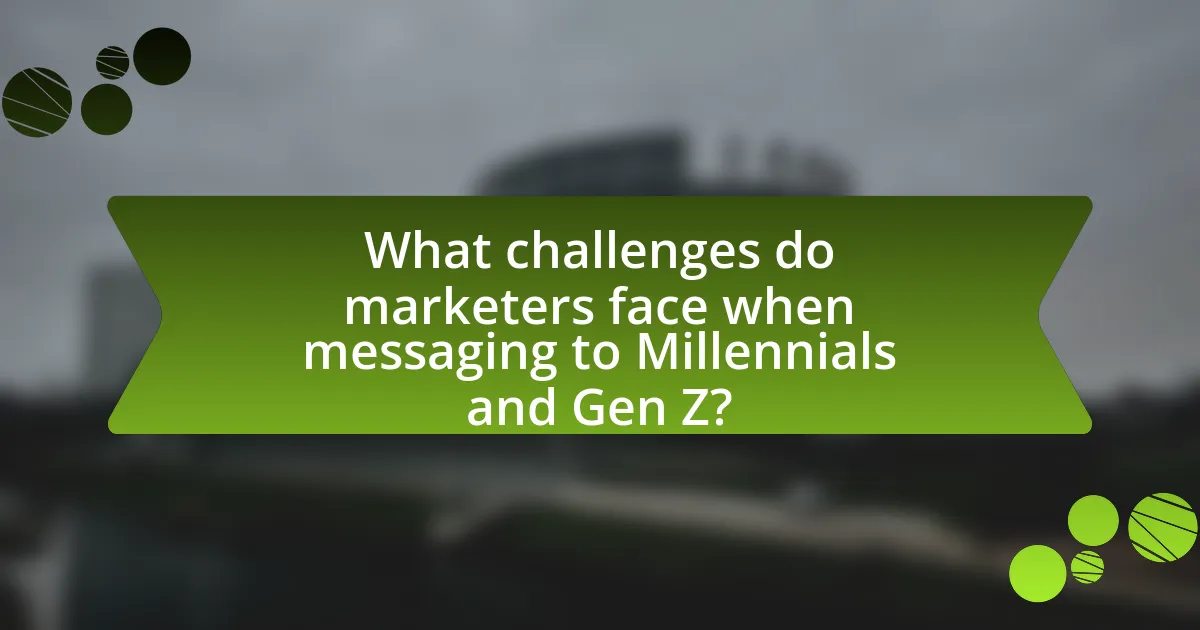
What challenges do marketers face when messaging to Millennials and Gen Z?
Marketers face significant challenges when messaging to Millennials and Gen Z, primarily due to their distinct preferences for authenticity and engagement. These generations prioritize genuine connections and are quick to reject brands that appear insincere or overly promotional. For instance, a study by McKinsey & Company found that 70% of Gen Z consumers prefer brands that demonstrate social responsibility and authenticity in their messaging. Additionally, the rapid evolution of digital platforms complicates marketers’ efforts, as these audiences frequently shift their preferred channels, making it difficult to maintain consistent engagement. Furthermore, both generations exhibit shorter attention spans, with research indicating that Gen Z has an average attention span of just 8 seconds, necessitating concise and impactful messaging.
How can brands overcome generational stereotypes in their messaging?
Brands can overcome generational stereotypes in their messaging by employing inclusive and diverse representation that resonates with various age groups. Research indicates that 70% of consumers are more likely to purchase from brands that reflect their values and identities, highlighting the importance of authenticity in messaging. By utilizing data-driven insights to understand the preferences and behaviors of different generations, brands can tailor their content to avoid clichés and stereotypes. For instance, campaigns that feature multi-generational casts and narratives can foster relatability and connection, thereby enhancing engagement across age demographics.
What are common misconceptions about Millennials and Gen Z?
Common misconceptions about Millennials and Gen Z include the belief that they are entitled and lazy. In reality, research shows that both generations are highly motivated and value work-life balance, often prioritizing meaningful work over traditional job security. For instance, a 2020 study by Deloitte found that 77% of Millennials and 83% of Gen Z respondents expressed a desire for their work to have a positive impact on society. Additionally, the stereotype of being tech-obsessed overlooks their critical approach to technology; they often seek authenticity and transparency from brands, as highlighted in a 2021 report by McKinsey, which indicated that 70% of Gen Z consumers prefer brands that align with their values.
How can brands address these misconceptions effectively?
Brands can address misconceptions effectively by employing transparent communication strategies that resonate with Millennials and Gen Z. These generations value authenticity and are more likely to trust brands that openly acknowledge their shortcomings and clarify misunderstandings. For instance, a study by Edelman found that 81% of consumers need to trust a brand to buy from them, highlighting the importance of honesty in messaging. Additionally, brands can utilize social media platforms to engage directly with their audience, allowing for real-time feedback and clarification of any misconceptions. This approach not only fosters a sense of community but also demonstrates a commitment to understanding and addressing consumer concerns.
What are the best practices for creating inclusive messaging?
The best practices for creating inclusive messaging involve using language that respects and acknowledges diverse identities and experiences. This includes avoiding jargon or idioms that may not be universally understood, ensuring representation in imagery and examples, and actively seeking feedback from diverse audiences to refine messaging. Research indicates that inclusive messaging can enhance engagement and brand loyalty, as seen in a study by the American Psychological Association, which found that 70% of consumers prefer brands that reflect their values and identities.
How can brands ensure their messaging is culturally sensitive?
Brands can ensure their messaging is culturally sensitive by conducting thorough research on the cultural contexts of their target audiences. This involves understanding the values, beliefs, and social norms of different cultural groups, which can be achieved through focus groups, surveys, and collaboration with cultural experts. For instance, a study by the American Psychological Association highlights that culturally aware marketing can lead to a 20% increase in brand loyalty among diverse consumer segments. By actively engaging with diverse communities and incorporating their feedback into marketing strategies, brands can create messages that resonate authentically and avoid cultural missteps.
What strategies can be employed to reach diverse audiences within these generations?
To reach diverse audiences within Millennials and Gen Z, brands should employ targeted digital marketing strategies that leverage social media platforms, influencer partnerships, and personalized content. Research indicates that 90% of Gen Z and 75% of Millennials use social media as their primary source of information, making platforms like Instagram, TikTok, and Snapchat essential for engagement. Additionally, utilizing influencers who resonate with specific cultural or demographic segments can enhance credibility and relatability, as 70% of Gen Z consumers are influenced by social media personalities when making purchasing decisions. Personalization through data analytics allows brands to tailor messages that reflect the values and interests of these generations, increasing the likelihood of engagement and conversion.
What practical tips can brands implement to enhance messaging effectiveness?
Brands can enhance messaging effectiveness by utilizing data-driven insights to tailor their content for specific audiences. By analyzing demographic data, brands can identify the preferences and behaviors of Millennials and Gen Z, allowing them to create targeted messages that resonate with these groups. For instance, a study by McKinsey found that personalized marketing can lead to a 20% increase in sales, demonstrating the impact of tailored messaging. Additionally, incorporating visual content, such as videos and infographics, can significantly improve engagement rates, as research from HubSpot indicates that 54% of consumers prefer to see video content from brands. Lastly, maintaining authenticity and transparency in messaging fosters trust, which is crucial for these generations; a survey by Sprout Social revealed that 86% of consumers believe that authenticity is important when deciding what brands they like and support.
How can brands leverage social media trends to engage these generations?
Brands can leverage social media trends by creating authentic, relatable content that resonates with Millennials and Gen Z. These generations prioritize transparency and social responsibility, so brands should align their messaging with current social issues and trends, such as sustainability and inclusivity. For instance, a study by Sprout Social found that 70% of consumers are more likely to support brands that take a stand on social issues. Additionally, utilizing popular platforms like TikTok and Instagram, brands can engage through interactive content, such as challenges or polls, which fosters community and encourages user-generated content. This approach not only enhances brand visibility but also builds a loyal customer base among these demographics.
What role does user-generated content play in messaging strategies?
User-generated content (UGC) plays a crucial role in messaging strategies by enhancing authenticity and engagement among audiences, particularly Millennials and Gen Z. This demographic values peer opinions and relatable content, making UGC a powerful tool for brands to build trust and foster community. According to a study by Nielsen, 92% of consumers trust organic, user-generated content more than traditional advertising, highlighting its effectiveness in influencing purchasing decisions. By incorporating UGC into messaging strategies, brands can create a more relatable narrative that resonates with these generations, ultimately driving higher engagement and loyalty.
